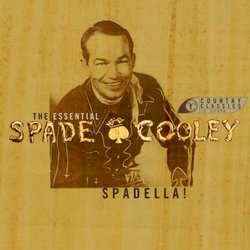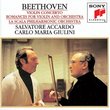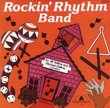| All Artists: Spade Cooley Title: Spadella: Essential Spade Cooley Members Wishing: 3 Total Copies: 0 Label: Sony Original Release Date: 11/1/1994 Release Date: 11/1/1994 Genres: Country, Pop Style: Western Swing Number of Discs: 1 SwapaCD Credits: 1 UPC: 074645739229 |
Search - Spade Cooley :: Spadella: Essential Spade Cooley
 | Spade Cooley Spadella: Essential Spade Cooley Genres: Country, Pop
Cooley was one of the more curious characters in the annals of country music. In the mid-1940s, Cooley was riding high: he was king of the Southern California ballroom circuit; a radio, TV, and movie star; and, according t... more » |
Larger Image |
CD DetailsSynopsis
Amazon.com Cooley was one of the more curious characters in the annals of country music. In the mid-1940s, Cooley was riding high: he was king of the Southern California ballroom circuit; a radio, TV, and movie star; and, according to legend, winner of a battle of the bands with Bob Wills. Following this 1943 victory over Wills's Playboys, Cooley declared himself "King of Western Swing" and signed a recording contract with OKeh, the results of which are found here. These 20 songs cover territory from merry ballads to blistering instrumentals. With Tex Williams handling the vocal chores, and fiery pickers such as Johnny Weis (guitar), Noel Boggs, and Joaquin Murphey (steel) behind him, the Cooley band packed a mean punch, with fiddles, harp, and accordion adding to the frenzy. These mid-1940s records, many of them big hits, marked the acme of Cooley's career and his life. His movie and TV successes dried up, his best band (this one) was stolen away by Williams, and in 1969, Cooley died while in prison for murdering his wife. --Marc Greilsamer Similar CDs
|
CD ReviewsThe True Club of Spade, but not what you think is! Tony Thomas | SUNNY ISLES BEACH, FL USA | 11/25/2003 (5 out of 5 stars) "Neither Bob Wills nor certainly not Spade Cooley would have seen themselves as part of "Country" music in their heyday. They would have felt insulted to be included in the same business as Roy Acuff or even Ernest Tubb. They saw themselves as part of the big band music, and pop Jazz of the Hollywood Studio variety. Especially Cooley, but also Wills, hired people from and lost people to big white swing bands. Jimmy Wyble who played leader guitar with both and helped set the guitar trio sound that was standard for all 1940s Western swing went on to become Frank Sinatra's guitarist of choice in the 1950s!!! It is true in the 1950s, the existence of Western Swing as a separate entity slowly collapsed and a never before existing amalgam called "Country Western" came into being. However, the musicians in these bands considered themselves more part of Jazz and pop music than they did the WSM, Grand Ole Oprey, version of Country Music. There is the famous incident in 1945 when Bob Wills was on the Grand Ole Oprey and almost left before because the Oprey tried to stop him from bringing his drums and horns on stage. The Oprey never thought of asking Cooley with his harps and choruses of violinists. Spade Cooley was always a ways uptown from Wills. He comes out of the Hollywood singing cowboy crowd, being a cellist who was a body double for Roy Rogers in films. He knitted a band together among the more educated musicians working the Hollywood western music scene at the start of WWII. Jimmy Wyble who worked for both Wills and Cooly talked about how Cooley was pretty disciplined, and wanted nothing strange and wanted the band to stay with what was known in the 40s and 50s as the "businessman's bounce," the tone of all moderation. Everything is harmonized and moderate. Wills, on the other hand, allowed anythign that he and the audience liked, like Wyble playing Charlie Christian style solos and leads whenever he felt like it. At the same time on this record we have the first and best band Cooley ever put together. Being not much of a musician himself and a disciplinarian, Cooley regularly fired all of his musicians and subsequently had worse and worse bands until he wound up with his mediocre all-women ensembles of the 1950s. This band really rocks and rolls and scurries around despite Cooley's moderate intentions. It features the incomparable Joaquin Murphy on steel guitar in his glory. Listen to what he and the band do to the Oklahoma Stomp to hear Hollywood western swing at its acme starting out with a Harp intro and leading on to some of the wilder dirtier driving steel playing ever recorded. This was the hot band Cooley had coming out of the war which had fantastic battles of the bands with Bob Wills' Texas Playboys before tens of thousands of fans on the Santa Monica and Venice piers in Los Angeles. If you like this band, you will like the first band that Tex Williams had, since it is made up of 90 percent of the musicians on this record, including Williams who is lead singer on a number of tunes here. Cooley as you know ended his career by being imprisoned for sadistically murdering his wife and torturing his daughter because he was suspicious that his wife was having an affair with his friend Roy Rogers. (See Nick Tosches Country Music for more on this). Being a Bob Wills man, I realize in the late 1950s right after that happened Wills came out with a version of Cooley's hit "Shame on You" (one of the few repertoire's Wills had not raided at that point). At the end of the cut Wills shouted "Shame on You Spade Cooley!" Oh what musical rivalry will do!" Spadella Hotter'n'hella! James Otterstrom | Big Bear City, CA United States | 08/26/2000 (5 out of 5 stars) "Every musical era has a peak, and for me, these mid-forties 'Columbia/Okeh' treasures are the absolute pinnacle of 'Western Swing'. This album cooks even at a simmer, but when it reaches the boiling point, the playing here is astounding, with Spade Cooley's fiddle on fire, and the band right there fueling the flames. 'Oklahoma Stomp' is a guitar/drum tour de force with Spade's fiddle as kindling. On 'Three Way Boogie', accordianist George Bambi, Cooley, and guitarist Joaquin Murphey burn the barn---some of the hottest squeeze-box playing you're ever likely to hear complimented with a killer uncredited piano solo---try to keep your foot still during this one! Cooley's fiddle on 'Spadella' soars in & out of the proceedings like an instrument possessed, and catch the driven intensity of his playing at the beginning & end of 'Swingin' The Devil's Dream'. 'Steel Guitar Rag' again shows off the bands guitar proficiency and 'Cow Bell Polka' is a fiddle, guitar, and accordian romp that should convert even the most 'polka-phobic' of listeners. The instrumental prowess of this band permeates the ballads as well, complimenting Tex Williams warm textured vocals with unwaveringly tasteful accompaniment. All throughout this classic assortment of western songs the everpresent dance of Spade Cooley's fiddle weaves inspired patterns, sharing the cloth equally with profound performances by some of the most accomplished pedal steel, electric guitar, and accordian players of the day---with a hefty kick from Muddy Berry's hot drums. The musicianship on these recordings is startling, the electricity tangible, yet sadly, the genius captured here was also the apex of Spade Cooley's phenomenal career. Spade's fire burned fast & furious, and his rapport with his band-members was short-lived. When Spade fired Tex Williams most of the band left with him, and Cooley's popularity began a long slow decline. Unfortunately, like so many legendary musicians before and since, Spade Cooley's life eventually crashed in self-destructive tragedy, leaving Bob Wills as the undisputed 'King Of Western Swing'. Will's infectious talent, the sheer span of his career, and volumes of great recordings ensure that. But from 1944 to 1946, as evidenced here, Mr. Cooley trumped him in 'Spades', giving 'The Texas Playboy's' a run for their money, and raising the bar for the music that followed. The folks at Sony did an admirable job with this release, the booklet is fairly comprehensive, and the sound quality is very good, deserving of 5-stars plus.Jim Otterstrom" A Movie Waiting To Happen James Otterstrom | 10/22/2008 (5 out of 5 stars) "You're a script-writer and you present to Hollywood or a TV Network a story about a C&W swing band leader who, for a brief period in the mid-1940s, is such a rival of the great Bob Wills and His Texas Playboys that his group wins a competitive "Battle Of The Bands" at the Venice Pier Ballroom, after which he begins to bill himself as The King Of Western Swing. He also would make many movie appearances, mostly as a bit player, but also as a stand-in for Roy Rogers, King Of The Cowboys.
After his hit singles dry up in 1947 (after registering six - far short of Bob Wills 26 hits) he turns to the new medium of television and, from 1949 to 1956 will host the Saturday night Hoffman Hayride out of Los Angeles, a show so popular that, at one point, it will draw 75% of L.A. sets. Also a man with drinking and temper problems, he has long harbored suspicions that his wife had had an affair with Roy Rogers and this, in turn, will lead to a series of heart attacks. It would all come to a head on April 3, 1961 when, in front of his 14-year-old daughter, he would strangle his wife of 16 years to death. After barely escaping the death penalty, and suffering another heart attack in court, he is sentenced to life imprisonment at the Vacaville Medical Center prison/hospital complex in California, where he would become a model inmate, organizing a musical education program and even forming a prison band. At his parole hearing in August 1969 he learns he will be released in February 1970, and in November 1969 authorities give him a 72-hour release to do a benefit concert for the Alameda County Sheriff's Association. After receiving a standing ovation, and thanking the audience "for the chance to be free for a while" he walks off-stage, collapses from another heart attack, and dies on the spot. The script is then handed back to you with the comment that no one would believe such a story. But every word is true about Donnell Clyde "Spade" Cooley, born in Grand, Oklahoma on December 17, 1910. And it's all detailed in the fascinating 10 pages of liner notes written by Al Quaglieri, which also contains several photos of Spade and his band, a list of the members of his group and the instruments they played, and a complete discography of the contents. And among the 20 tracks are the original renditions of five of the six hits as well as those B-sides that did not chart. His first was his best, as Shame On You went all the way to # 1 on what then passed for the Country charts in the spring of 1945 b/w A Pair Of Broken Hearts, which also charted at # 9, on Okeh 6731, a subsidiary of Columbia. That fall, I've Taken All I'm Gonna Take From You hit # 4 b/w Forgive Me One More Time on Okeh 6746. In the spring of 1946, and five years before Patti Page, he had a # 2 with Detour on Columbia 36935. The one irritant with this release is that, instead of the original version of the flipside, You Can't Break My Heart, which hit # 3 by itself, they present an alternate take. A year later he had his final hit when Crazy `Cause I Love You finished at # 4 b/w the instrumental Three Way Boogie on Columbia 37058. The primary vocalist on each such track is Tex Williams, who would go on to post 24 hits of his own from 1946 to 1974. With that one really idiotic exception, this is a solid compilation with excellent sound reproduction from Columbia Legacy covering one of the great tragic stories to emanate from the world of Country Music." |

 Track Listings (20) - Disc #1
Track Listings (20) - Disc #1

